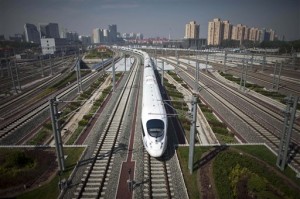China unveils high-speed train despite safety woes

AP Photo
SHANGHAI – China has unveiled a prototype train capable of reaching speeds up to 500 kilometers (310 miles) an hour, state media said Tuesday, as the nation pushes ahead with high-speed rail despite a fatal crash.
China has built the world’s largest high-speed rail system from scratch in less than a decade, but a collision between two high-speed trains in July that killed at least 40 people led it to suspend new projects.
The new experimental train was unveiled in the eastern province of Shandong at the weekend by state-owned train maker CSR Corp, the China Daily newspaper said.
The train, whose sleek design was inspired by an ancient Chinese sword, was built using plastic reinforced with carbon fibre and magnesium alloy to reduce weight and therefore increase speed, the report said.
There was no indication of when the six-car train would be put into commercial use.
Article continues after this advertisementChina’s bullet trains routinely travelled at around 300 kilometers an hour, but the government reduced speeds after the July accident, which involved trains made by CSR.
Article continues after this advertisementInitial reports suggested signalling problems were to blame for the crash, which sparked strong public criticism of China’s government, but the results of an official investigation have not yet been released.
Separately, a new high-speed railway linking the capital of the southern province of Guangdong, Guangzhou, to Shenzhen city on the border with Hong Kong went into service Monday, the official Xinhua news agency said Tuesday.
China plans to extend the route to Hong Kong by 2015 as part of the planned Beijing-Hong Kong high-speed line, it said.
The latest moves come despite China saying last week it will cut spending on its railways next year.
The railways ministry will invest 400 billion yuan ($63 billion) on rail infrastructure in 2012, down from an estimated 469 billion yuan this year and 700 billion yuan in 2010, state media said.
The cash-strapped ministry is burdened by debt after borrowing to finance railway projects and some banks have stopped lend.